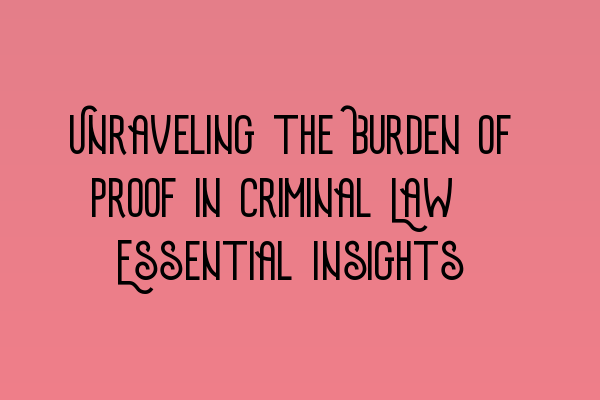Unraveling the Burden of Proof in Criminal Law: Essential Insights
As criminal defense solicitors, it is crucial to have a deep understanding of the burden of proof in order to effectively represent our clients in court. The burden of proof refers to the responsibility placed on the prosecution to prove beyond a reasonable doubt that the defendant committed the alleged crime. This concept is fundamental to the criminal justice system and plays a significant role in ensuring fair and just trials.
The Presumption of Innocence
Central to the burden of proof is the principle of the presumption of innocence. Every person charged with a criminal offense is considered innocent until proven guilty. This means that the burden rests solely on the prosecution to provide sufficient evidence to convince the judge or the jury of the defendant’s guilt.
It is important to note that the burden of proof is different from the standard of proof. While the burden lies with the prosecution, the standard of proof required is “beyond a reasonable doubt.” This standard is significantly high and requires the prosecution to present evidence that leaves no reasonable doubt in the minds of the judge or the jury about the defendant’s guilt.
The Role of the Criminal Defense Solicitor
As criminal defense solicitors, our role is to vigorously challenge the prosecution’s evidence and cast doubt on their case. We must diligently investigate the facts, gather evidence, and analyze the weaknesses in the prosecution’s argument. By doing so, we aim to create reasonable doubt in the minds of the judge or the jury regarding the defendant’s guilt.
Having a solid understanding of the burden of proof allows us to effectively cross-examine the prosecution’s witnesses, challenge the admissibility of evidence, and present a strong defense strategy. It is our duty to protect the rights of our clients and ensure that they receive a fair trial.
Building a Strong Defense
In order to build a strong defense, it is crucial to thoroughly review and analyze the evidence provided by the prosecution. This includes scrutinizing witness statements, examining forensic reports, and assessing any other potential evidence that may support the defendant’s version of events.
Additionally, as part of our preparation for trial, we may consider utilizing SQE 1 Practice Exam Questions and SQE 1 Practice Mocks FLK1 FLK2 to enhance our knowledge of criminal law and practice. These resources can help us familiarize ourselves with different scenarios and sharpen our legal skills to effectively challenge the prosecution’s case.
Furthermore, to remain well-informed and up-to-date on criminal law, it is recommended to enroll in SQE 2 Preparation Courses and SQE 1 Preparation Courses. These courses provide comprehensive training on both the practical and theoretical aspects of criminal law, equipping us with the necessary knowledge and expertise to navigate complex legal issues.
Conclusion
The burden of proof is a foundational concept in criminal law. As criminal defense solicitors, we must appreciate the presumption of innocence and understand the role it plays in safeguarding the rights of our clients. By actively challenging the prosecution’s case and building strong defenses, we strive to ensure fair and just outcomes in criminal trials.
If you’re interested in learning more about the SQE exams or SRA SQE Exam Dates, feel free to visit the following related articles:
- SQE 1 Practice Exam Questions
- SQE 1 Practice Mocks FLK1 FLK2
- SQE 2 Preparation Courses
- SQE 1 Preparation Courses
- SRA SQE Exam Dates
